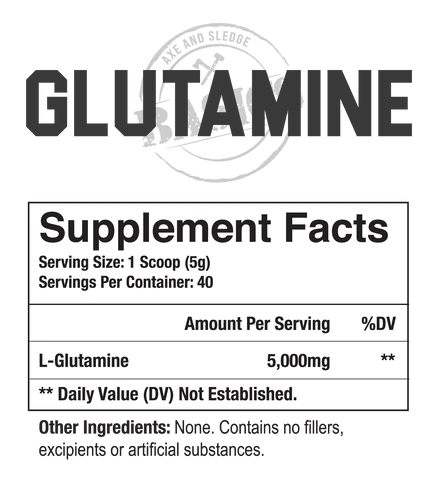



Glutamine is technically classified as a non-essential amino acid since the body can produce it endogenously. Glutamine is also found in various protein-rich foods, such as dairy, meat, tofu, poultry, and fish.
However, many would argue that glutamine is at least conditionally essential since there are specific times when the body could benefit from having more than it can synthesize on its own, such as illness, injury, or extreme stress (i.e. intense exercise & dieting). Furthermore, glutamine is one of the most abundant amino acids in the body and is involved in a lot more than just muscle protein synthesis.
Glutamine plays a crucial role in your immune, gastrointestinal, and musculoskeletal systems. In fact, supplementing with glutamine may be even more beneficial for immune function and gut health than enhancing muscle recovery. Some evidence suggests that glutamine utilization of immune and gastrointestinal cells is higher than glucose. This indicates that glutamine is the preferred fuel source for these cells, which is quite different from any other system in the body. The majority of other cells primarily use glucose as opposed to glutamine.

Mix 1 scoop with 6-8 Oz of water or in your favourite beverage.
Some powdered products, including (but not limited to) pre-workouts, fat burners and pump formulas are prone to clumping over a long period of time due to the nature of the ingredients.
Although Supplements Central ensures all descriptive, nutritional and visual information is up to date, suppliers may change product formulations and ingredients without warning, and may not advise of us these changes.
Do not exceed recommended daily dosage. Do not consume products if seals are broken or damaged.
Sports Supplements, vitamins and minerals should never replace a balanced and varied diet.
Always read the label. Follow directions of use. Please read the label to decide whether this product is right for you.
Always consult with a healthcare professional before taking sports, vitamins or mineral supplements, especially when pregnant or breastfeeding. If symptoms persist, please seek advice from your relevant health care professional.
Products should not be considered a sole source of nutrition and should be consumed in conjunction with a nutritious diet and appropriate training or exercise program.
Products containing caffeine are not recommended for children, pregnant or lactating women, or individuals sensitive to caffeine.
Keep all supplements and vitamins out of reach of children. Always follow the correct dose and storage instructions.
Glutamine is technically classified as a non-essential amino acid since the body can produce it endogenously. Glutamine is also found in various protein-rich foods, such as dairy, meat, tofu, poultry, and fish.
However, many would argue that glutamine is at least conditionally essential since there are specific times when the body could benefit from having more than it can synthesize on its own, such as illness, injury, or extreme stress (i.e. intense exercise & dieting). Furthermore, glutamine is one of the most abundant amino acids in the body and is involved in a lot more than just muscle protein synthesis.
Glutamine plays a crucial role in your immune, gastrointestinal, and musculoskeletal systems. In fact, supplementing with glutamine may be even more beneficial for immune function and gut health than enhancing muscle recovery. Some evidence suggests that glutamine utilization of immune and gastrointestinal cells is higher than glucose. This indicates that glutamine is the preferred fuel source for these cells, which is quite different from any other system in the body. The majority of other cells primarily use glucose as opposed to glutamine.

Mix 1 scoop with 6-8 Oz of water or in your favourite beverage.
Some powdered products, including (but not limited to) pre-workouts, fat burners and pump formulas are prone to clumping over a long period of time due to the nature of the ingredients.
Although Supplements Central ensures all descriptive, nutritional and visual information is up to date, suppliers may change product formulations and ingredients without warning, and may not advise of us these changes.
Do not exceed recommended daily dosage. Do not consume products if seals are broken or damaged.
Sports Supplements, vitamins and minerals should never replace a balanced and varied diet.
Always read the label. Follow directions of use. Please read the label to decide whether this product is right for you.
Always consult with a healthcare professional before taking sports, vitamins or mineral supplements, especially when pregnant or breastfeeding. If symptoms persist, please seek advice from your relevant health care professional.
Products should not be considered a sole source of nutrition and should be consumed in conjunction with a nutritious diet and appropriate training or exercise program.
Products containing caffeine are not recommended for children, pregnant or lactating women, or individuals sensitive to caffeine.
Keep all supplements and vitamins out of reach of children. Always follow the correct dose and storage instructions.
